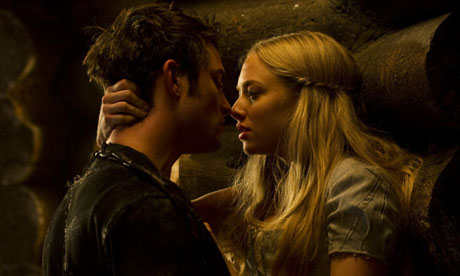
What big hands? … Max Irons and Amanda Seyfreid in Red Riding Hood
The story of Red Riding Hood has its roots in ancient Asian myth, but the version that's come down to us was pretty much shaped by the first known printed rendering. This was published in 1697 by Charles Perrault, a civil servant at the court of Louis XIV. His pretty heroine's red headgear would then have been unusually provocative attire. She stops to talk to the wolf though she shouldn't have done, takes her clothes off, gets into bed with him and marvels at the size of his body parts. Then he eats her up.
Lest there be any doubt about the moral of this tale, Perrault added an admonitory coda. Attractive young women should never talk to strange men; the apparently gentlest of these smooth-pelted wolves were the most dangerous. In his day, marriages were arranged by parents, and brides had to be virgins. Daughters' sexual appetites were a threat to the social system. The story wasn't a lament for female victimhood, but a warning to wanton girls to stay in line.
A hundred years later, the brothers Grimm'sLittle Red Cap bears even more blame for the fate that is to befall her. Her mother has ordered her to behave herself on the way to her grandmother's and forbidden her to leave the path. On the other hand, rescue is now on hand in the shape of a hunter who slits open the wolf's belly and extracts the foolish girl. A young woman rash enough to transgress could apparently still hope for redemption, but only in the arms of a good man.
In the last century, feminists subverted the fable's repressive messageand turned it into one of libidinous empowerment. A story in Angela Carter's The Bloody Chamber has her hero triumphantly fulfilling her own desires and embracing her hairy bedmate. In Neil Jordan's 1984 film, The Company of Wolves, which was loosely based on two stories from the book, red-caped Rosaleen flouts warnings about men who are "hairy on the inside" and chooses a wolf over the constraints of convention.
Now, at a time when female sexual awakening continues to enthral, Hollywood offers us Red Riding Hood. What's its take?
Amanda Seyfried's Valerie is as full of lip, as wide of eye and as menstrually cloaked as you could wish. Yet she's no precocious scarlet woman. On the contrary, she's a dreary model of girlish virtue. She professes herself a rule-breaker, but adheres to conventional pieties. She fears that the hunky male she fancies may be carnivorous, but he's actually a perfect gent with only her safety at heart. Her burgeoning desire turns out to be about as edgy and disturbing as Bella Swan's.
You could say we were warned, since Red Riding Hood is billed as "From the director of Twilight". However, it's also billed as "The breathtaking vision of a 700-year-old legend". And while Stephenie Meyer's saga deserved all it got, you might have thought that Catherine Hardwicke would have celebrated her release from its thrall with a rather more lusty approach to one of our most potent myths.
Yet perhaps we shouldn't be surprised. Young women's sexual power may have alarmed tellers of fairy tales, but at least they were willing to address it. Today the movies seem more timorous. It's not that they fail to acknowledge the assertiveness of the teen female. She's allowed to be as pushy as Election's Tracy, as resourceful as Harry Potter's Hermione, as mean as Mean Girls' mean girls, as violent as Carrie's Carrie, as independent as Juno's Juno and even as mechanically capable as Transformers' Mikaela. Yet in the romantic arena, she still often seems unreconstructedly soppy.
It's not just Valerie and Bella. Even that lioness of the tweenies, Miley Cyrus, became oddly compliant when required to succumb to big-screen adolescent romance. Recent Brit specimens, like Fish Tank's Mia or An Education's Jenny, have been content to play victim to cunning male wiles. Yet outside the cinema, it's the girls who could be seen to crack the sexual whip.
Young women may have acquired new kinds of strength, but they haven't lost old ones either. Films shouldn't be frightened to celebrate it.